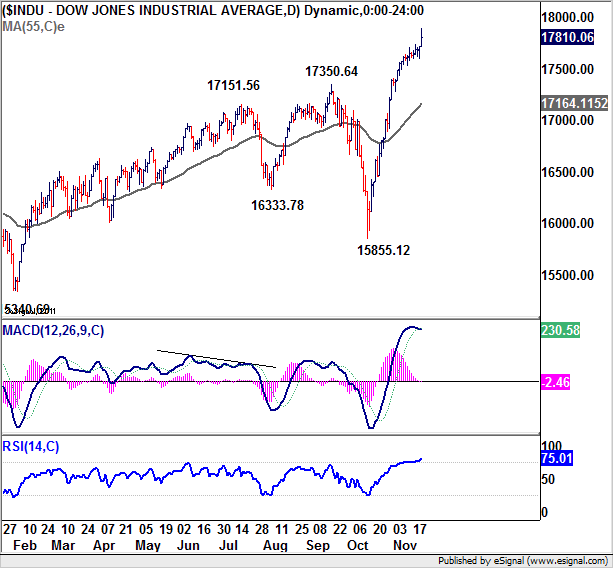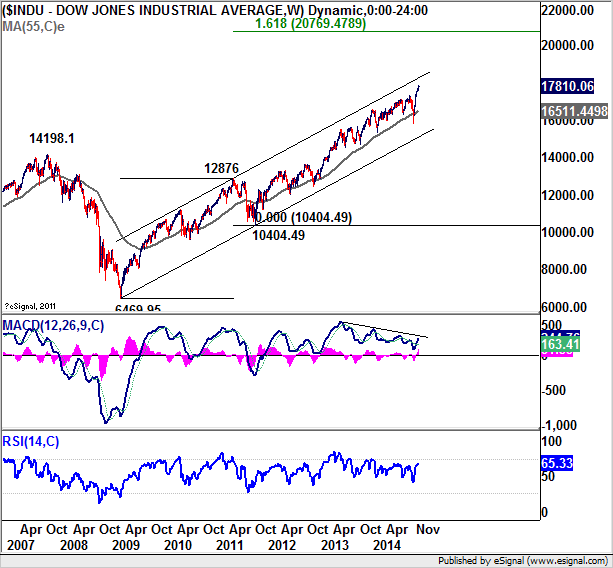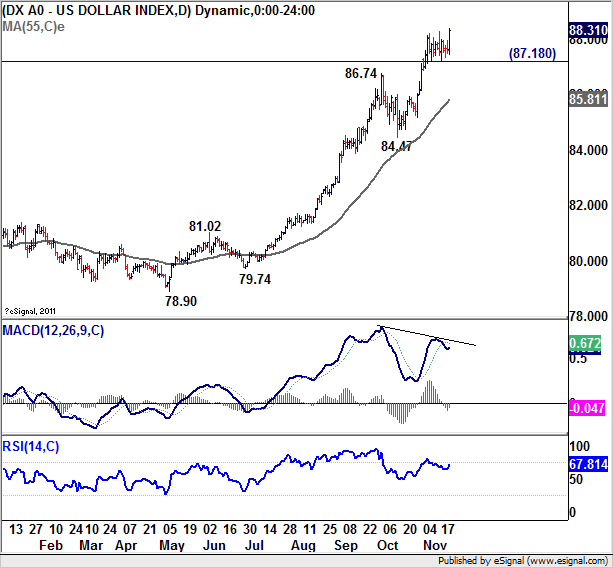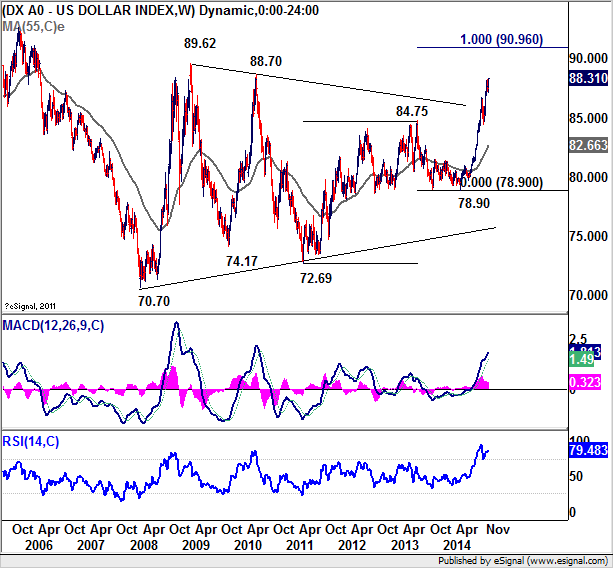Yen ended as the weakest currency again last week as prime minister Shinzo Abe finally announced his decision to delay the next sales tax hike and called a snap reaction. Euro and Swiss Franc followed as the next weakest currencies on dovish comments from ECB president Mario Draghi. Among the European majors, Sterling was clearly the stronger one as lifted by less dovish than expected BoE minutes. Canadian dollar ended as the strongest currency after being pushed higher by stronger than expected inflation reading as well as sign of bottoming in crude oil. Dollar ended as the second strongest currency but the strength was somewhat overshadowed by the rebound in commodity currencies, which was boosted by the surprised rate cut in China. In other markets, US stocks were pushed to new record highs on Friday by PBoC's rate cut and regathered upside momentum again. Treasury yields were stuck in tight range. Gold and Crude Oil recovered despite the relatively firm dollar.
Here are recaps of some of the major events. The FOMC minutes for the October meeting suggested that policymakers remained confident about the economic outlook. They acknowledged improvement in the labor market and believed that the 2% inflation target would be reached in the coming years. While recent weaknesses in the global economy would affect domestic growth, the impact so far had been 'quite limited'. We continue to expect the first rate hike would be implemented by 1H15 and expect the Fed to drop the 'considerable time' language in December. More in Fed Sees Inflation Target within Reach, Impacts of Overseas Slowdown Limited.
Speaking at a conference in Frankfurt, ECB president Mario Draghi said that ECB will do "what we must to raise inflation and inflation expectations as fast as possible, as our price-stability mandate requires." And, more importantly, "if on its current trajectory our policy is not effective enough to achieve this, or further risks to the inflation outlook materialize, we would step up the pressure and broaden even more the channels through which we intervene, by altering accordingly the size, pace and composition of our purchases."
Japan prime minister Shinzo Abe finally formally called for an early election to salvage his Abenomics and gather support for delay of the second planned sales tax hike. The parliament will be dissolved on November 21. As elections must be held within 40 days, the vote is expected on December 14. Abe aimed to delay the sale tax increase scheduled for October 2015 for 18 months. BoJ left policies unchanged as widely expected. Governor Haruhiko Kuroda won the tight 5-4 vote on additional monetary stimulus during the October 31 meeting, which included raising the annual target of monetary base expansion to JPY 80T. But this time, Takahid Kiuchi is the only board member dissented to the decision in maintaining the target.
The BOE minutes for the November meeting showed that the members voted 7-2 to keep the Bank rate unchanged at 0.5%. Yet, there were divisions among the 7 members favoring the status quo. The Committee decided unanimously to keep asset purchases at 375B pound. The pound rose against the US dollar for the first time in 6 days as some members showed concerns that inflation might overshoot the central bank's target, suggesting that the stance to keep the policy rate near zero might need to be adjusted. More in BOE Minutes Showed Splits among Those Favored Keeping Rates Unchanged.
The RBA minutes for the November meeting contained few surprises. Policymakers reiterated the forward guidance that 'the most prudent course was likely to be a period of stability in interest rates'. They also continued to complain about the strength in the Aussie. Yet, the central bank showed particular concerns over the property markets, at home as well as in China. BOJ's expansion of asset purchase was also discussed. More in RBA Raised Concerns Over Housing Markets, Both At Home And In China.
The People's Bank of China surprised the markets by cutting interest rates for the first time in more than two years as the economy slowed to the lowest pace in more than five years in Q3. The benchmark one-year loan rate was lowered by 0.40% to 5.6%. The benchmark one year deposit rate was lowered by 0.25% to 2.75%. Also, banks are allowed to offer interest of 1.2 times the deposit rate, up from prior 1.1 times.
DJIA surged to new record high of 17810.06 last week. Technically, the index stays comfortably inside the long term rising channel started back at 6469.96 in 2009. Also, it's being well supported by rising 55 weeks EMA. Thus, overall bullish trend is intact even though bearish divergence is seen in weekly MACD. From near term point of view, the index might start to see some strong resistance above 18000 handle as it approaches channel resistance.


Dollar Index's strengthened to close at 88.31and the break of prior resistance at 88.26 indicate up trend resumption. Further rise would be seen this week. But we'd like to point out again that firstly, bearish divergence condition is seen in daily MACD. Secondly, the index will enter long term resistance zone of 88.70/89.62. Thus, we'd be cautious on further loss of upside momentum ahead and because of topping in the greenback soon.


